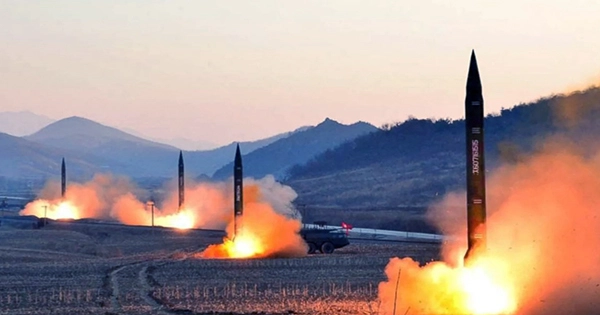South Korea is said to have fired missiles in retaliation for a North Korean ICBM that landed in Japanese seas today. Despite previously agreeing with the international community that these weapons would not be tested, North Korea has launched an ICBM for the first time since 2017. In the last few days, North Korea has tested a number of weapons capable of carrying nuclear bombs. According to Sky News, South Korea has responded by firing numerous missiles in a live-fire test and declaring that they are ready and capable of launching direct, accurate attacks on the origin of the North Korean missiles.
North Korea shot a missile that landed in the Japanese exclusive economic zone (EEZ) roughly 170 kilometers (106 miles) west of Japan’s coast, according to the Japanese coast guard. Reuters reported that the missile flew 1,080 kilometers (670 miles) from near Pyongyang, according to South Korea’s Joint Chiefs of Staff. According to Tokyo’s Chief Cabinet Secretary Hirokazu Matsuno, the flight took 71 minutes and landed somewhere near the island of Hokkaido. This is a dangerously close impact point that has sparked outrage in South Korea, Japan, and the United States.
It’s thought to be the greatest North Korean missile test ever, and it might possibly be a “new type” of ICBM, according to Japan’s Deputy Defense Minister. There have been claims that it was a Hwasong-17, which is larger than the Hwasong-15 discovered in 2017, although this has yet to be confirmed. In the aftermath of the repeated launches, White House Press Secretary Jen Psaki issued a statement criticizing them in the harshest possible terms.
“This launch is a flagrant violation of numerous UN Security Council resolutions, raising unnecessary tensions and putting the region’s security situation in danger,” Psaki said in a statement. “This conduct illustrates that the DPRK continues to place a higher priority on its weapons of mass destruction and ballistic missile programs than on its people’s well-being.”
According to accounts, a tunnel in North Korea collapsed after the country’s most recent nuclear test, killing up to 200 construction workers. According to Japan’s TV Asahi, the event occurred on September 10, one week after the country conducted its sixth nuclear test at the Punggye-ri nuclear test site on Mount Mantap on September 3. It’s unknown if the tunnel collapsed as a result of the explosion, which was considered to be a hydrogen bomb ten times more powerful than the Hiroshima bomb.














